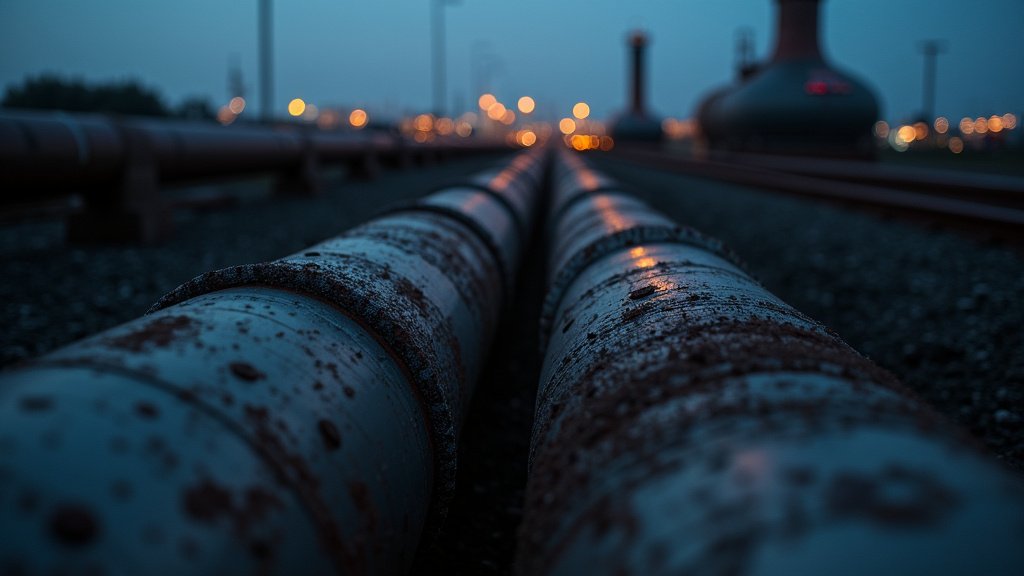Oregon Faces Fuel Emergency as Olympic Pipeline Leak Forces Partial Shutdown and Restart
The Olympic Pipeline has partially restarted operations following a significant Olympic Pipeline leak that forced a complete shutdown. This crucial step comes after the leak, and the pipeline is vital for the Pacific Northwest’s fuel supply. Oregon remains under a state of emergency due to the Olympic Pipeline leak and its impact on fuel availability. This news has implications for travel and fuel prices, as the region grapples with a potential fuel supply disruption.
Olympic Pipeline Leak Halts Critical Fuel Flow
The Olympic Pipeline experienced a significant leak. It was discovered east of Everett, Washington, on November 11th. The pipeline operator, BP, began excavating the area and worked around the clock to address the Olympic Pipeline leak. The leak occurred in the 20-inch segment of the pipeline, which consists of two parallel lines: a 16-inch and a 20-inch segment. The discovery of the Olympic Pipeline leak triggered an immediate operational halt.
Emergency Declaration for Oregon Amidst Olympic Pipeline Leak Concerns
Oregon Governor Tina Kotek declared a state of emergency in response to the Olympic Pipeline leak and subsequent shutdown. The Olympic Pipeline supplies over 90% of Oregon’s fuel, making the emergency declaration critical for ensuring fuel availability. The declaration loosens regulations for fuel transport, allowing fuel to enter Oregon by barge, truck, and rail, and permitting truck drivers to work longer hours. This response to the Olympic Pipeline leak aims to mitigate a severe fuel supply disruption and was set to last until December 24th, with provisions for extension or early termination.
Restart and Ongoing BP Pipeline Repairs Following Olympic Pipeline Leak
BP confirmed a partial restart of the pipeline system on Tuesday, November 25th, 2025, with the 16-inch segment restarting first after testing revealed no leaks. Repair plans for the 20-inch segment, affected by the Olympic Pipeline leak, are currently being developed. A definitive timeline for full repair is not yet available. BP stated that safety and the environment remain top priorities throughout the BP pipeline repairs and the handling of the Olympic Pipeline leak.
Impact on Travel and Prices Due to Pipeline Shutdown
The pipeline shutdown, stemming from the Olympic Pipeline leak, raised concerns about Thanksgiving travel due to its role as a major artery for gasoline, diesel, and jet fuel. Seattle-Tacoma International Airport (Sea-Tac) relies heavily on the pipeline for jet fuel. While some airlines warned of potential schedule changes, many implemented contingency plans, such as bringing in extra fuel by truck. Sea-Tac officials reported no major impacts, and Portland International Airport (PDX) expects no issues due to its ability to receive jet fuel by barge. The Olympic Pipeline leak caused a temporary fuel emergency.
Oregon’s average gas price saw a small increase, climbing about four cents since the outage. Marie Dodds of AAA Oregon/Idaho noted minimal impacts, expecting prices to resume seasonal declines now that the pipeline is partially open. Price gouging remains illegal during the emergency declared due to the Olympic Pipeline leak.
Pipeline’s History and Importance, Including Past Olympic Pipeline Leaks
The Olympic Pipeline is a 400-mile system running from refineries near Seattle to Portland, Oregon, serving as the primary system for transporting refined petroleum products west of the Cascades. It is considered the backbone of the region’s fuel supply, especially crucial for Oregon, which has no refinery capacity. This is not the first incident for the Olympic Pipeline; previous Olympic Pipeline leaks and shutdowns have occurred, including a tragic incident in 1999 in Bellingham. Understanding the history of Olympic Pipeline leaks emphasizes the importance of ongoing maintenance.
Future Outlook Following the Olympic Pipeline Leak
While the 16-inch segment has restarted, repairs continue on the 20-inch line following the Olympic Pipeline leak. The emergency declaration in Oregon remains in effect for now as officials monitor the situation closely to prevent significant fuel shortages or price spikes. The partial restart is a positive step after the critical Olympic Pipeline leak, but the full restoration of service is still pending. This incident highlights the critical need for reliable energy infrastructure and the ongoing challenges associated with the Olympic Pipeline.




